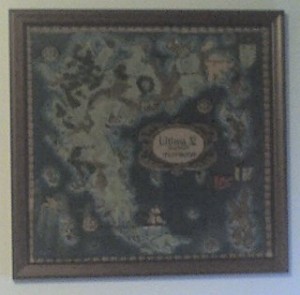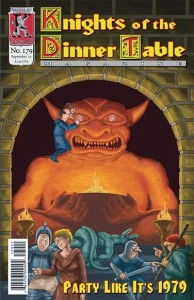RPG Development: What Inspires Me
Posted by Rampant Coyote on February 17, 2015
 Making indie games is, simply put, awesome. So is making RPGs. Making indie RPGs – man, if only it paid well, it’d be one of the greatest gigs on the planet. As it is, it’s an awesome hobby.
Making indie games is, simply put, awesome. So is making RPGs. Making indie RPGs – man, if only it paid well, it’d be one of the greatest gigs on the planet. As it is, it’s an awesome hobby.
But it’s also very hard – at least the way I do it. Maybe I’m just bad at it. But anyway – working on big projects (exactly the way I warn aspiring indie developers not to…) that take a long time to complete can be very difficult at times. Even as much as I love it, sometimes I need some inspiration to remind me what I’m doing and why I’m doing it. I need a little help to reconnect with the passion I feel for the genre. Or – particularly in the case of Frayed Knights – I need to re-connect with the sense of wonder of the old games I used to play, and the wild half-formed imaginations of adventure that went through my head as I read through the old D&D books or started up a new RPG on my Commodore 64.
I’ve surrounded myself with some things that – if I get too frustrated and feel like I’d rather be watching Netflix than debugging the spell list code which randomly, rarely, ends up with some uninitialized values. If I find myself wondering, “Why am I bothering,” these things around my office quickly answer my question:
* An original cloth map from Ultima V, framed and hanging on the wall next to my desk chair.
* The map from Zork 1, from an old boxed set of the entire series given to me by Curtis Mirci of Califer Games
* An original promotional poster from Everquest, given to me by a Sony producer at GDC in either 1998 (before it was released) or in 1999.
* The first edition Advanced Dungeons & Dragons books, particularly the Player’s Handbook and Dungeon Master’s Guide.
* The paper manual from Wizardry 6: Crusaders of the Dark Savant (the manual was written by Brenda Romero). I remember thumbing through it while installing the game the first time, trying to figure out how I was going to set up my party.
* A booklet of journal entries from the Gold Box games – compiled into a single book in a boxed set of the series I picked up in the early 90s.
* The Official Book of Ultima, by Shay Addams. Lots of going back over Richard Garriott’s history and methodology.
 * Lots of issues of Knights of the Dinner Table.
* Lots of issues of Knights of the Dinner Table.
* The GIMLET evaluation criteria from The CRPG Addict. He’s done a pretty good job of breaking down the most appealing factors of classic RPGs. Actually, one of the best parts of the GIMLET system is how it allows games from radically different eras to be compared directly to each other without providing a heavy weighting on technological factors.
* Soundtracks – especially from classic games (a good reason to get games from GOG.COM – they do try to include soundtracks). I have a playlist specifically for developing fantasy games that is 4.5 days in length. And still the same songs seem to repeat… but anyway, some favorites that work well for me are mainly from favorite games: Re-orchestrated or remixed music from Ultima 7, Ultima Underworld, and Daggerfall, the soundtracks from Vampire the Masquerade: Redemption, the Diablo and Torchlight series, Final Fantasy VII, Baldur’s Gate, Icewind Dale, Might & Magic 6 – 8, Wizardry 8, Neverwinter Nights, and many others. (As an amusing aside, I have some music in my playlist from games I haven’t actually played. It’s weird when I finally get around to playing the game and immediately recognize the soundtrack…)
* And of course, the games themselves. That’s actually a dangerous thing, as it can be very easy to loose hours of productivity to an old game you are looking over for “research.”
Those are the big ones. Of course, 99% of the time I’m oblivious to them all (except sometimes the soundtracks). But every once in a while, it doesn’t hurt to thumb through an old manual or look at an old map and remember what it was like to explore those worlds.
Filed Under: Game Development - Comments: Read the First Comment
Xian said,
I have many of the same memorabilia that you listed, the cloth maps from Ultima III-V, Zork Map (though mine is from The Lost Treasures of Infocom collection), Dark Savant manual, and the Official Book of Ultima. And many, many more such as the Vault Dwellers Survival Guide or the Ankh from Ultima IV and Black Rock from Ultima VII. I can see how they would provide an incentive for a RPG developer.
I have pretty much every game manual with extras from every game I bought, going back to at least 1984. My biggest regret is that I did not keep the boxes, but I moved frequently when I was younger and didn’t want to keep hauling them around.
One of my favorite soundtracks was Spellforce 2 Shadow Wars by Dynamedion. I remember reading that the lady that did the vocals just made up the elven lyrics. A sample is on youtube:
https://www.youtube.com/watch?v=WOdgUxVcik4